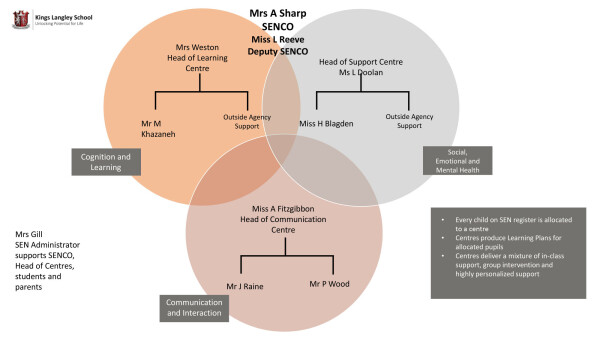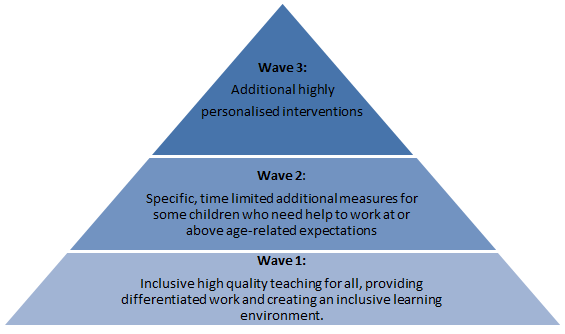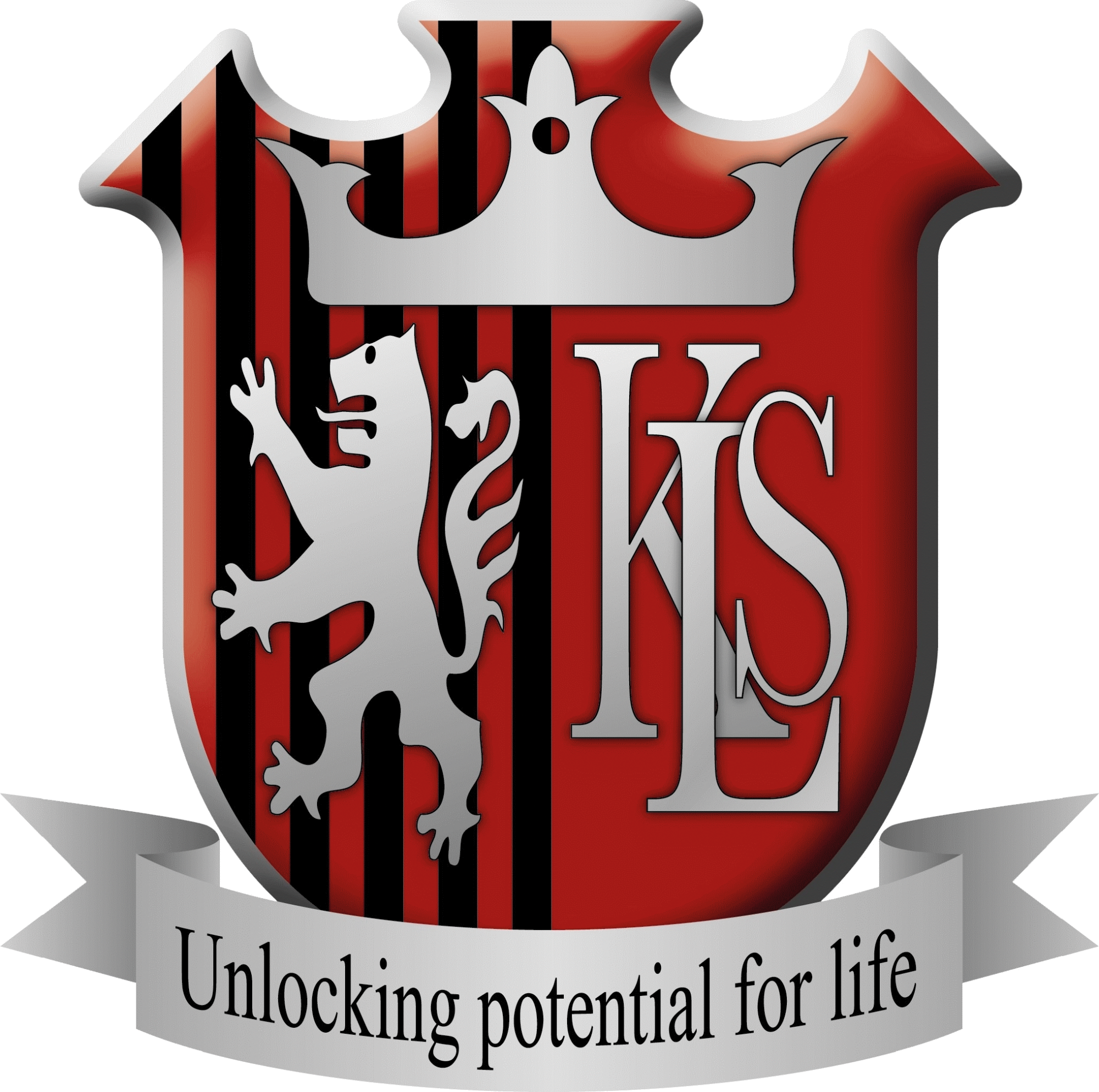SEND Provision
SEND Areas of Need
Special Educational Needs and Disabilities (SEND) are divided into areas of need:
-
Cognition and Learning.
-
Social, Emotional and Mental Health.
-
Communication and Interaction.
-
Sensory and/or Physical.
How SEND Provision Works at Kings Langley School
The Learning Support Department is led by the SENCo, Mrs Sharp. Kings Langley School have divided the department into three sub centres, combining the communication and sensory areas of need. Whilst the department is one cohesive area, the three centres each have their own leads who work closely together as most students with SEND will have a primary need but, as the graphic shows, these needs may overlap into another area.

The Centre Leads
-
SENCO - Mrs Sharp
-
Deputy Senco - Miss Reeve.
-
Cognition and Learning Centre Lead - Mrs E Weston
- Communication and Interaction Centre Lead - Miss A Fitzgibbon
-
Social, Emotional, and Mental Health Lead - Mrs Doolan
-
Each of these can be contacted via Mrs Gill, SEN Administrator, on lsdp@kls.herts.sch.uk
The SEND Family Support worker will work with families on an individual basis to understand their specific challenges and work with them on developing plans of support. Additional SEND information and support can be provided by the Dacorum DSPL team. Visit www.dacorumdspl.org.uk
Kings Langley School Waves of Provision
The triangle diagram demonstrates the waves of provision at Kings Langley School. (Further specific details are in the table below)
-
Wave 1: All Students - quality first teaching with differentiation, scaffolding and challenge in an inclusive learning environment.
-
Wave 2: Targeted Groups - small group interventions to support specific needs within the curriculum.
-
Wave 3: Individual Students - targeted, personalised interventions and support.

What does Inclusive Quality First Teaching Look Like?
High achievement for all through high expectations and high aspirations where the learning needs of all students are considered:
- Lessons are well planned, focused and differentiated appropriately with clear success criteria.
- A planned range of teaching skills, strategies and approaches are deployed to engage all children.
- Practitioners provide clear explanations of teaching points and use appropriate questioning to develop understanding and to set challenges.
- Students are fully engaged in their learning, having opportunities to work both independently and collaboratively. Positive praise and effective feedback promotes further learning.
What do the Kings Langley School Waves of Support Look Like?
|
Area of Difficulty |
Wave 1
Inclusive quality first teaching for all |
Wave 2
Additional interventions to secure age related expectations |
Wave 3
Targeted and personalised interventions |
|
Cognition and Learning
|
Quality first teaching with differentiation, scaffolding and challenge in an inclusive learning environment. Teaching assistant (TA) support in class. Access to assessment for identification of significant needs. Dedicated and caring staff who value students Classrooms use increased visual aids. Additional TA support at lunchtime in Homework Hub. Access to ICT to help reduce barriers to learning. Structured school and classroom routines. |
Small group booster sessions in Mathematics. Small group booster sessions in English. Paired reading/numeracy work completed by sixth formers. Subject specific catch up programmes at lunchtimes and after school. Staff updated via Learning Plans for individual students including recommended strategies. Ongoing assessment of all students in the Cognition and Learning Centre. |
1:1 in school support. Exam/assessments access arrangements. Learning Plans tailored to student needs. On-going monitoring and regular feedback to parents/carers. Cognition and Learning Centre Lead updates/meets with parents Support from external agencies where appropriate. Pastoral support and referrals. Specialist teacher support. |
|
Communication Centre |
Quality first teaching with differentiation, scaffolding and challenge in an inclusive learning environment. Form Tutor, Pastoral Lead and Learning Mentor as first point of contact. Complies with Disability Discrimination Act. Transition - visits to Primary School by the Pastoral Lead and SENCo. Parents receive transition booklet. Teachers take into account individual needs in class seating plans. Access to ICT to help reduce barriers to learning. |
Transition – student visit to KLS for orientation. Staff updated via Learning Plans for individual students, including recommended strategies. Small group booster sessions Lunchtime Peer Support group (facilitated by Support Centre Staff). Access to assessment for identification of significant language needs. Ongoing assessment of all students in the Communication Centre. Time out cards. The Centre offers safe space for students. |
A transition visit to the School for the student and parents. Referrals to outside agencies: Education Psychologist, CAMHS etc. Communication Centre Lead updates/meets with parents. Further assessments. Individual resources. Communication Centre Lead updates/meets with parents. Exam Access Arrangements. Student Trips may be supported. Time out cards. Crisis management. Managed timetables to reduce anxiety/stress/behavioural pinch points. |
| Support Centre |
Form Tutor, Pastoral Lead and Learning Mentor as first point of contact. Quality first teaching with differentiation, scaffolding and challenge in an inclusive learning environment. Complies with Disability Discrimination Act. Transition - visits to Primary School by the Pastoral Lead and SENCo. Parents receive transition booklet. Transition support between key stage 3/4/5. Teachers take into account individual needs in class seating plans. All staff are trained in safeguarding – we have designated DSPs. PSE lessons including the Penn Resilience Programme in Y7 |
Staff updated via Learning Plans for individual students, including recommended strategies. Transition – student visit to the School for orientation. Social Skills group support. Lunchtime Peer Support group (facilitated by Support Centre Staff). Drop in sessions for advice on daily issues. Ongoing assessment of all students in the Support Centre. Time out cards. The Support Centre offers a safe space for students. Learning Mentors with option to refer to counsellors. |
Referrals to outside agencies: Education Psychologist and CAMHS etc. Support Centre Lead updates/meets with parents. Student Trips may be supported. Transition visit to Kings Langley School for student and parents. Further assessment. 1:1 support. Counselling within the school remit. Time out cards. Crisis management. Exam access arrangements. Managed timetables to reduce anxiety/stress/behavioural pinch points. |
The Local Offer
The 'local offer' term was specified by government. The Hertfordshire Local Offer gives information on what support is available in the local area for children and young people with special educational needs or disabilities and their families.
Services for parents, carers and families (hertfordshire.gov.uk) From this page you can find all the different types of support that parents and carers of children and young people with SEND might be able to access, including information on support groups, mental health, parenting courses and how to access services such as SENDIASS.
Getting help at school from your SENCO (hertfordshire.gov.uk) This page explains what the role of a SENCO is, and how parents and SENCOs can work together to achieve the best results for a pupil.
If your child is too anxious to go to school (hertfordshire.gov.uk) This page is designed to help parents whose children’s attendance is low due to anxiety, and has advice on how to support them and where to go for help.
Contact a SEND service (hertfordshire.gov.uk) This page has contact details of the different SEND services, including details of Advice Line for EPs, the SLCA team, the SpLD team and others.
New to SEND (hertfordshire.gov.uk) This page has information and advice for those whose children have just been diagnosed with SEND, or have suspected SEND.
Further information
Special Educational Needs and Disability Code of Practice: 0 to 25 years
Supporting Pupils at School with Medical Conditions
Education Endowment Foundation – Making Best Use of Teaching Assistants
Mental Health and Behaviour in Schools
SEND Information Advice and Support (SENDIASS)
If you require further information regarding the content of this web page please contact Mrs Sharp, SENCo via lsdp@kls.herts.sch.uk

